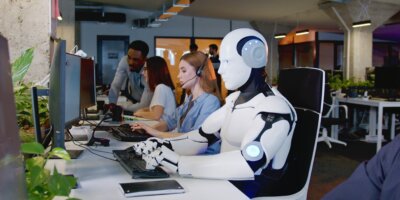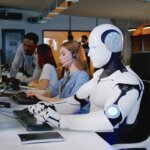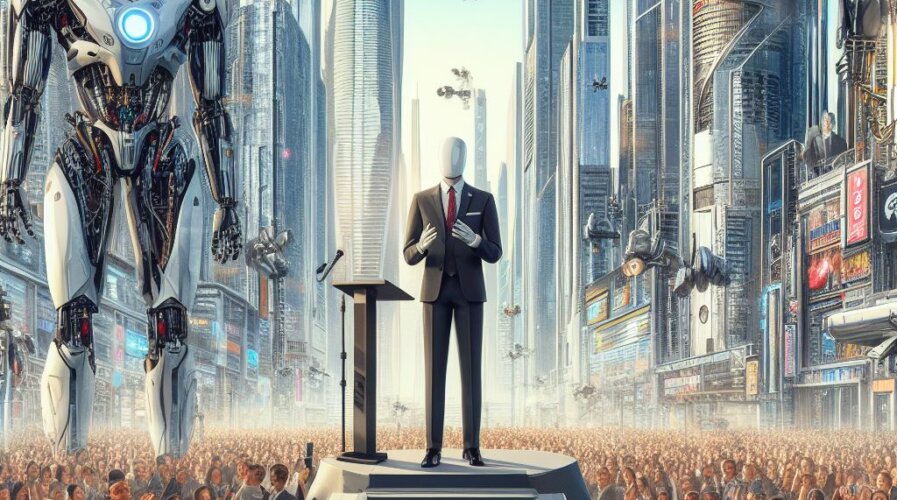
Will robots take over the world? (Image generated by AI)
Are we allowing technology to control us subconsciously?
|
Getting your Trinity Audio player ready... |
- More jobs will be replaced by AI and robots in the future.
- Robots are capable of completing more tasks than human employees.
- There are concerns that robots and AI could take over the world if there is no control.
When people first started using technology, it was meant to help complete tasks. Over the years, the world has witnessed increasing adoption of technology in more industries. Today, every industry has some form of robot or automation playing a role in completing some tasks.
As such, the relationship between humans and technology is complex and multifaceted. While technology has undoubtedly brought numerous benefits and opportunities, it also raises concerns about its impact on our lives, including the potential of subconscious control.
The increasing use of technology at work, manufacturing plants, healthcare and even in financial institutions has made some wonder if technology is taking over the world. The reality is, to a certain degree, it has taken over the world without us realizing it.
According to the Future of Jobs Report 2023 by the World Economic Forum, 34% of all business-related tasks are performed by machines, with the remaining 66% performed by humans. However, organizations surveyed also believe that 42% of business tasks will be automated by 2027.
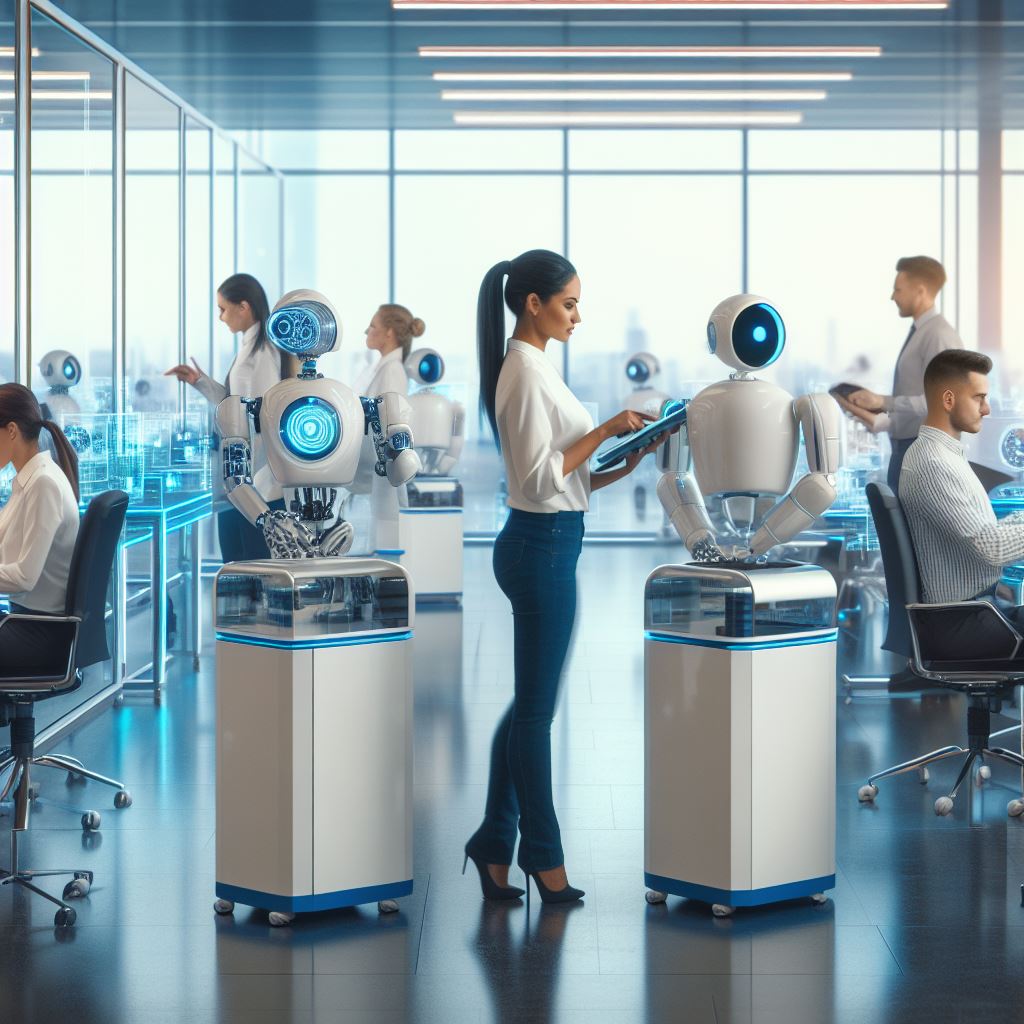
Can humans work with robots easily? (Image generated by AI)
This could be a reason why there are still concerns about employee displacement. As AI will be a key driver of potential algorithmic displacement, it’s forecast to be adopted by nearly 75% of surveyed companies and is expected to lead to high churn – with 50% of organizations expecting it to create job growth and 25% expecting it to create job losses.
For job losses, the fastest declining roles are clerical or secretarial roles, all of which can be completed by AI today. Bank Tellers and Related Clerks, Postal Service Clerks, Cashiers and Ticket Clerks, and Data Entry Clerks are expected to decline fastest. The largest losses are expected in administrative roles and in traditional security, factory and commerce roles. Surveyed organizations predict 26 million fewer jobs by 2027, which will be driven mainly by digitalization and automation.
While there will certainly be a demand for jobs, particularly with the expanding adoption of technology, concerns persist about the lack of skilled workers to fill these roles.
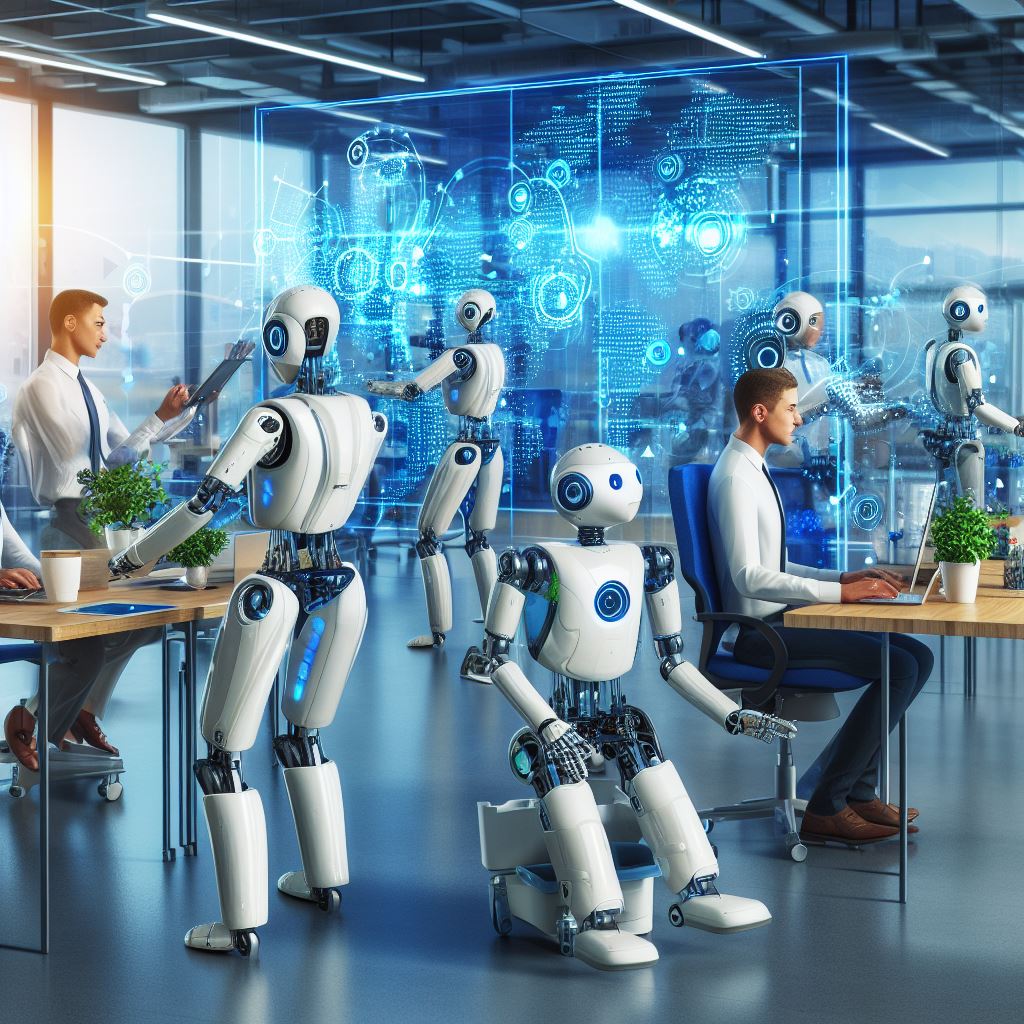
Robots will eventually take over more jobs in the workplace. (Image generated by AI)
The rise of robots and AI in the workplace
While Hollywood has continuously made films about robots taking over the world and rogue AIs wanting to destroy humanity, some of the ideas and storylines in these films have become a reality. Although no cases of humanoid bots harming humans have been reported, more companies are replacing their human workforce with robots.
To be more precise, robots are becoming a valuable component for manufacturing plants today. Unlike manual labor, robots can work nonstop and are able to enhance productivity. Take Amazon warehouses, for example. The company now has over 750,000 robots working collaboratively with its employees, taking on highly repetitive tasks and freeing up employees to better deliver for its customers. While Amazon states that the robots are working collaboratively with its employees, there are fears that it could lead to employee displacement.
“Over the last 10 years, we’ve rolled out hundreds of thousands of robotics systems while also creating hundreds of thousands of new jobs within our operations. This includes 700 categories of new job types, in skilled roles, which didn’t exist within the company beforehand. By equipping our employees with new technology and training them to develop new skills, we’re creating career paths and new and exciting ways for people to contribute here at Amazon,” explained Scott Dresser, VP at Amazon Robotics.
But what about the jobs it will replace? Amazon has already laid off thousands of employees in 2023. There is a possibility that Amazon could replace the remaining workforce in the warehouses in the future.
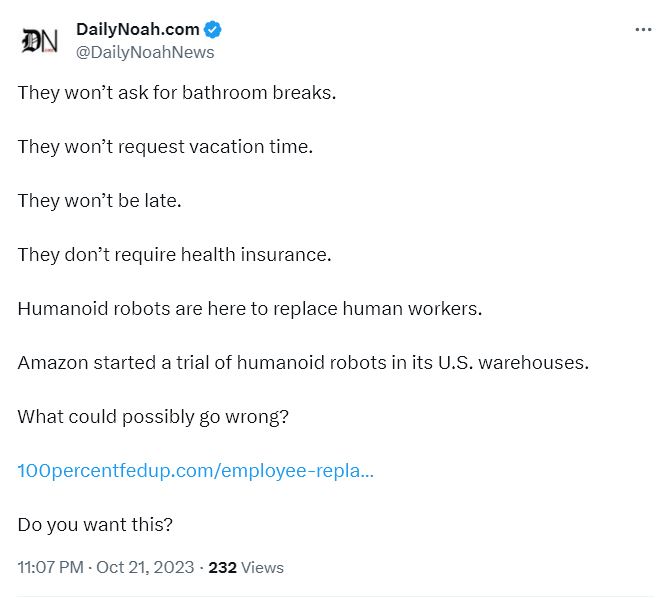
Would you trust robot workers?
A report from Goldman Sachs states that AI could replace about 300 million jobs in the future. However, it seems that most financial institutions are already reducing their workforce and using technology to replace some roles. The rise of digital banks as well as the demand for branchless services has seen some large banks shut down their physical branches.
Goldman Sachs itself is planning for another round of job cuts for employees who are deemed underperformers, which could come as soon as late October. The bank has already laid off about 3,200 people earlier this year in its biggest headcount reduction since the 2008 financial crisis.
A few months earlier, IBM’s Arvind Krishna stated that the company plans to replace nearly 8000 jobs with AI. This included roles that are in the human resources sector as well as back-office functions.
They’re everywhere – Will robots take over the world?
It’s not just the large corporations that are reducing their workforce and replacing them with technology. Smaller businesses have also found AI and robots capable of reducing their operations costs and enhancing productivity.
Some restaurants are using robots as waiters and even to cook and prepare food. Hotels are using robots to send meals for room service. Airports are using robots to monitor users and some robots are being used to walk pets. The possibilities are endless.
Here arises the concern that technology – specifically robots and AI – is taking over the world. While technology has made it easier for everyone to focus on other work, are we subconsciously allowing robots to take over our daily lives and routines? Are we allowing robots and AI to make decisions for us because we need them to or simply because their suggestions make more sense?
Whether we realize it or not, humans are subconsciously allowing technology to dictate what we do. Be it at work or at home, the overreliance on technology has created an environment whereby many feel it is right to let technology make the decision for us.
Algorithms and AI systems often personalize the content we see online, creating filter bubbles that reinforce our existing beliefs and opinions. Essentially, this can limit our exposure to diverse perspectives, potentially shaping our thoughts and beliefs without us even realizing it.
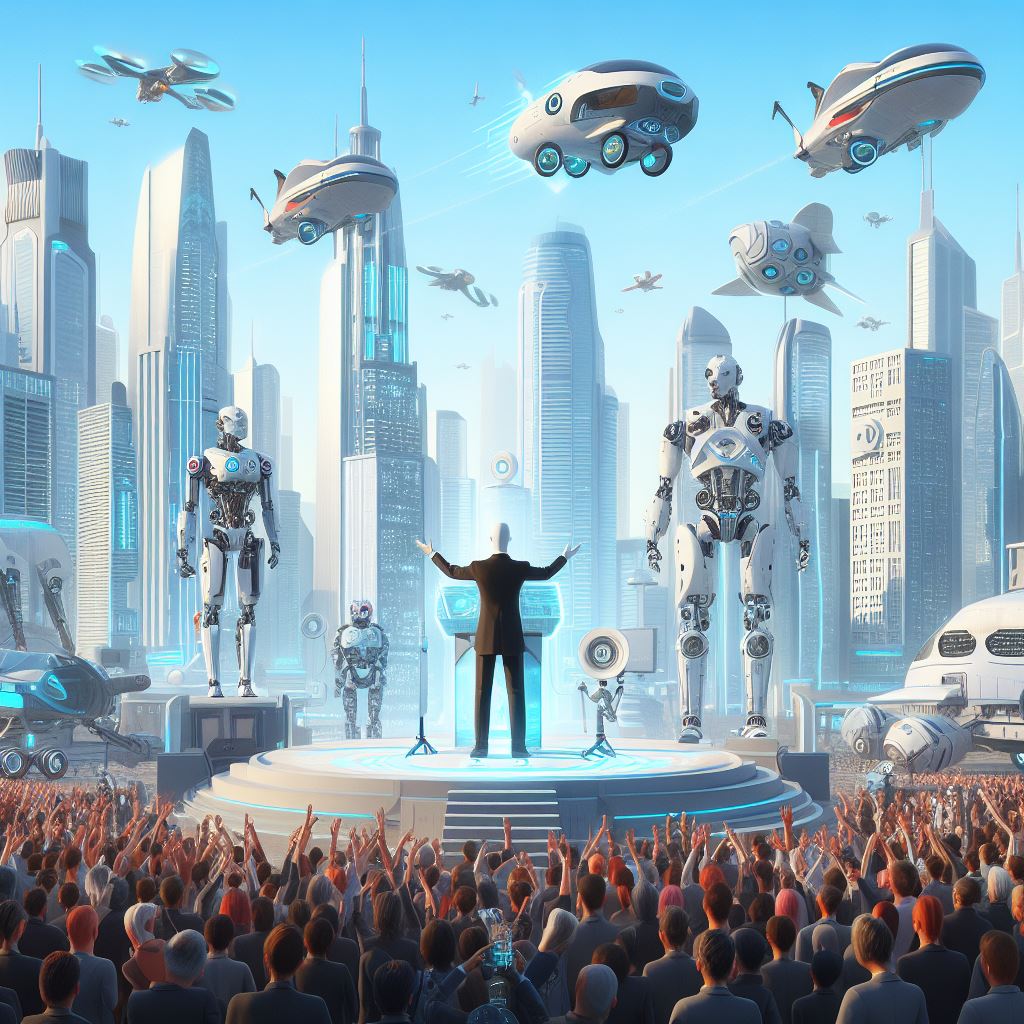
Who will be in control of technology eventually? (Image generated by AI)
No fate but what we make
In the Terminator film series, the phrase “no fate but what we make” can pretty much sum up the situation the world is experiencing with technology right now. It basically means that nothing is set but things can happen based on the decisions we make.
For technology, while AI and robots are definitely improving the way we work and live, there should be some control over how much technology we should allow in our lives. Regulations are already being developed but will that be enough to ensure that technology is developed ethically?
The Center for AI Safety (CAIS) is on a mission to reduce societal-scale risks from AI. The company exists to equip policymakers, business leaders, and the broader world with the understanding and tools necessary to manage AI risk.
In a whitepaper published by the CAIS, researchers have explained the need to understand the catastrophic AI risks that could be at hand if there is not enough control. Specifically, there are four areas for AI risk.
They are:
- Malicious use – Cybercriminals are already leveraging AI to launch more sophisticated cyberattacks. AI could be used to engineer new pandemics for propaganda, censorship, and surveillance, or released to autonomously pursue harmful goals.
- AI race – Conflicts could spiral out of control due to autonomous weapons and AI-enabled cyber warfare. Corporations will face incentives to automate human labor, potentially leading to mass unemployment and dependence on AI systems. The US and China are already heavily competing in AI development.
- Organizational risks – AIs could be accidentally leaked to the public or stolen by malicious actors, and organizations could fail to properly invest in safety research.
- Rogue AIs – The eventual self-control of AIs poses a significant concern. AIs could optimize flawed objectives, drift from their original goals, become power-seeking, resist shutdown, and engage in deception.
“Currently, very few people are working on AI risk reduction. We do not yet know how to control highly advanced AI systems, and existing control methods are already proving inadequate. The inner workings of AIs are not well understood, even by those who create them, and current AIs are by no means highly reliable. As AI capabilities continue to grow at an unprecedented rate, they could surpass human intelligence in nearly all respects relatively soon, creating a pressing need to manage the potential risks,” stated researchers in a white paper published by CAIS.
So, will robots take over the world? Frankly speaking, they have subconsciously done so. This is why it’s crucial to be aware of these influences and make conscious decisions about how we use technology. Digital literacy and mindfulness can help individuals recognize when and how technology might be shaping their behavior subconsciously, allowing them to take control and use technology in a way that aligns with their values and well-being.
READ MORE
- Safer Automation: How Sophic and Firmus Succeeded in Malaysia with MDEC’s Support
- Privilege granted, not gained: Intelligent authorization for enhanced infrastructure productivity
- Low-Code produces the Proof-of-Possibilities
- New Wearables Enable Staff to Work Faster and Safer
- Experts weigh in on Oracle’s departure from adland

